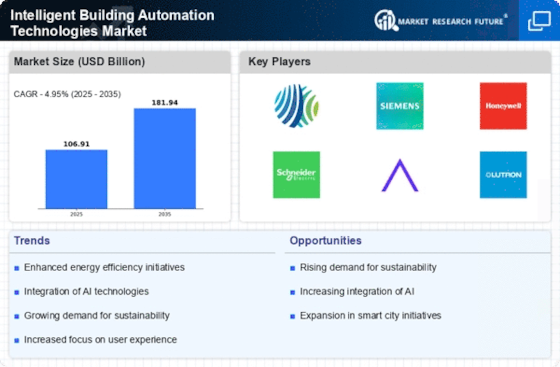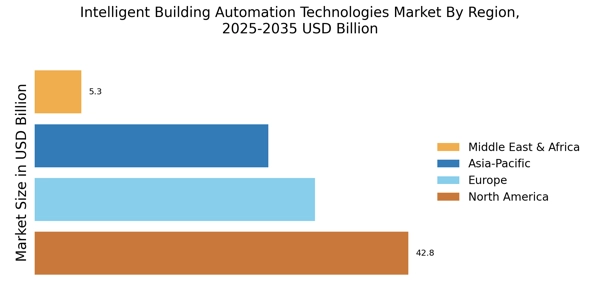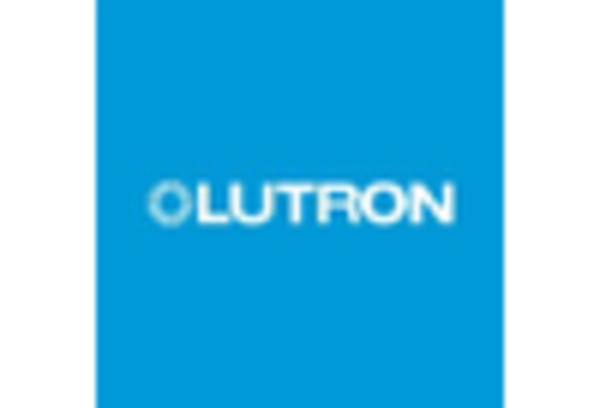Increased Focus on Sustainability
The Intelligent Building Automation Technologies Market is witnessing an increased focus on sustainability, driven by both consumer preferences and corporate responsibility. As awareness of environmental issues grows, building owners and operators are prioritizing sustainable practices in their operations. Intelligent building automation technologies facilitate this shift by optimizing energy usage and reducing waste. For instance, smart lighting systems and energy management solutions can significantly lower a building's carbon footprint. Research indicates that buildings equipped with intelligent automation technologies can achieve energy savings of up to 30%. This emphasis on sustainability not only enhances the market appeal of buildings but also aligns with broader environmental goals. Consequently, the Intelligent Building Automation Technologies Market is likely to thrive as stakeholders increasingly recognize the value of sustainable building practices.
Rising Demand for Smart Buildings
The Intelligent Building Automation Technologies Market is experiencing a notable surge in demand for smart buildings. This trend is driven by the increasing need for energy-efficient solutions and enhanced operational efficiency. As urbanization accelerates, the construction of smart buildings is becoming a priority for developers and property owners. According to recent estimates, the market for smart buildings is projected to reach USD 1 trillion by 2025, indicating a robust growth trajectory. This demand is further fueled by the integration of advanced technologies such as artificial intelligence and machine learning, which optimize building operations and reduce energy consumption. Consequently, the Intelligent Building Automation Technologies Market is poised to benefit significantly from this growing trend, as stakeholders seek to invest in innovative solutions that enhance building performance.
Government Initiatives and Regulations
Government initiatives and regulations play a crucial role in shaping the Intelligent Building Automation Technologies Market. Many governments are implementing stringent energy efficiency standards and sustainability goals, which compel building owners to adopt intelligent automation technologies. For instance, various countries have introduced tax incentives and rebates for energy-efficient upgrades, thereby encouraging investments in smart building technologies. The implementation of these regulations is expected to drive the market forward, as compliance becomes a necessity for new constructions and renovations. Furthermore, the push for sustainable development aligns with global climate goals, making intelligent building automation an essential component of future urban planning. As a result, the Intelligent Building Automation Technologies Market is likely to see increased adoption rates due to these supportive governmental frameworks.
Technological Advancements in Automation
Technological advancements are significantly influencing the Intelligent Building Automation Technologies Market. Innovations in automation technologies, such as the Internet of Things (IoT), cloud computing, and big data analytics, are transforming how buildings are managed and operated. These technologies enable real-time monitoring and control of various building systems, including lighting, HVAC, and security. The integration of IoT solutions is particularly noteworthy, as it allows for seamless communication between devices, leading to improved energy management and occupant comfort. Market analysts project that the adoption of these advanced technologies will contribute to a compound annual growth rate (CAGR) of over 25% in the Intelligent Building Automation Technologies Market over the next few years. This rapid growth underscores the importance of staying abreast of technological trends to remain competitive in the market.
Growing Urbanization and Population Density
The Intelligent Building Automation Technologies Market is significantly impacted by the trends of growing urbanization and increasing population density. As more individuals migrate to urban areas, the demand for efficient and smart building solutions escalates. Urban centers are facing challenges related to infrastructure, energy consumption, and resource management, necessitating the adoption of intelligent building automation technologies. These technologies provide solutions that enhance operational efficiency and improve the quality of life for urban residents. Projections suggest that by 2030, nearly 60% of the world's population will reside in urban areas, further intensifying the need for smart buildings. This demographic shift presents a substantial opportunity for the Intelligent Building Automation Technologies Market, as stakeholders seek to develop innovative solutions that address the complexities of urban living.

















